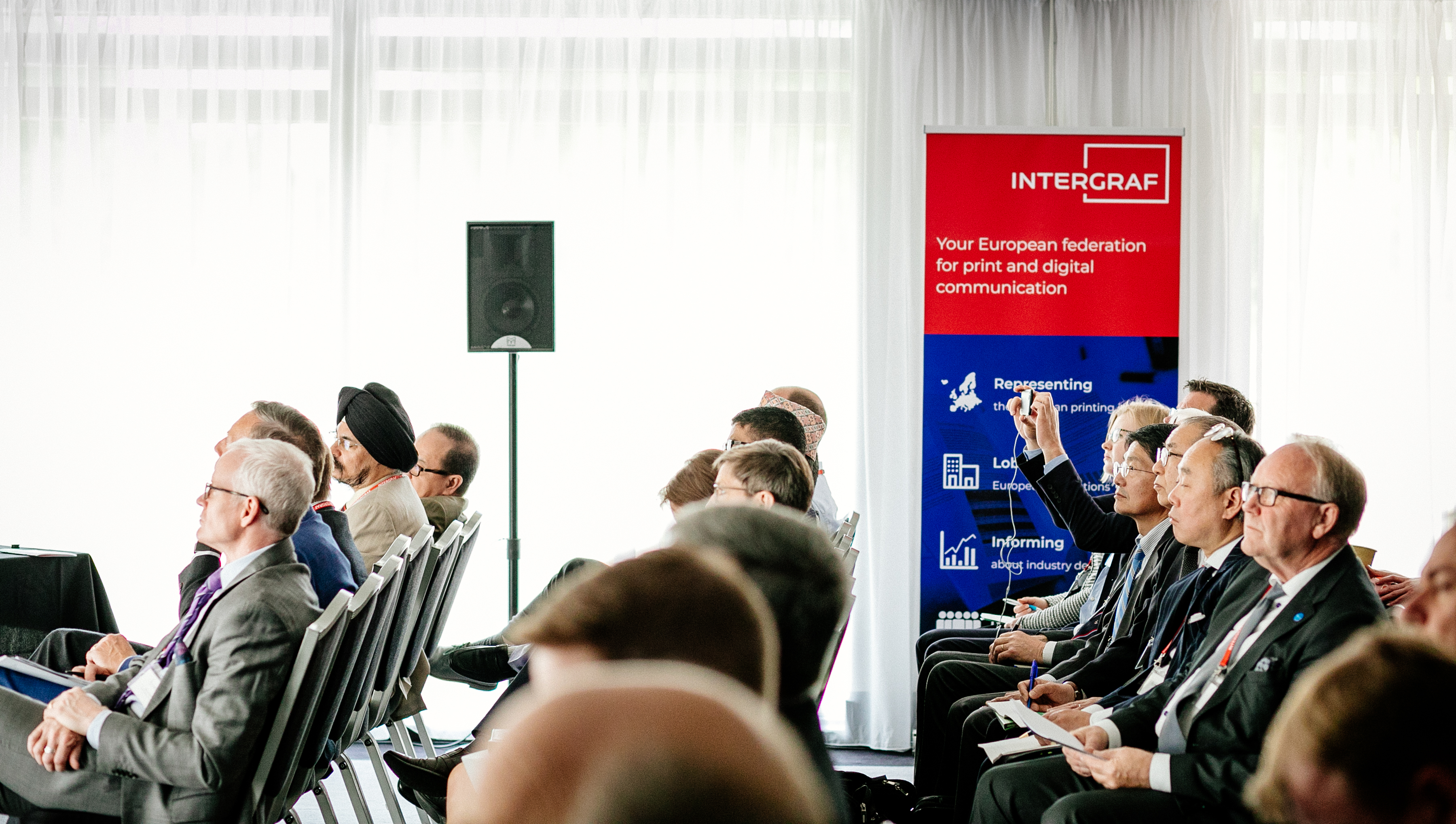PRINT UNDERPINS EUROPE'S DIGITAL TRANSITION
16 March 2021

On 9 March, the European Commission published a Communication on Europe's Digital Decade, presenting its vision for Europe's digital transformation by 2030 (link). We welcome this ambitious strategy and offer our support as a sector to facilitate a fair and inclusive digital transition. We will work with the European Commission as this strategy is implemented to ensure that print and digital are used to their best advantage.
Print plays a huge role in everyday life – so much so that it is frequently overlooked. But print is everywhere. This is also true for every EU initiative about Europe’s digital transition. The crucial role of print in facilitating the digital transition is embedded in every publication, but it is rarely explicitly addressed. As well as preventing a comprehensive exploration of issues relating to the digital transition, this omission does a disservice to the European printing industry and perpetuates false stereotypes that are damaging to print. The fundamental role of the printing industry in Europe’s digital transition should be openly acknowledged.
“Print is important for expression and promoting culture, for democracy, social inclusion, civic engagement, education, and for the economy. There will always be a need for printed products because there will always be a need for physical items and spaces. Digitisation offers us a lot, but life can never take place entirely online. Print is a powerful communications tool, and the printing industry has become an important part of Europe’s online landscape – providing digital jobs and products, as well as laying the foundations for green and digital transitions that are sustainable and inclusive.”
Beatrice Klose, Secretary General of Intergraf
Print fills the digital gap
Print is essential for a fair and inclusive digital transition and will remain so long into the future. The pandemic has underscored the importance of digital technologies, but it has also highlighted the wide digital gap between those who have (and have sufficient skills to use) digital tools and those who do not. The number of people in Europe with insufficient digital skills has dropped by only 1% in the last 4 years – from 43% to 42% – and only 35% of those aged 55-74 and 30% of the retired and the inactive possess basic digital skills (DESI, 2020).
The Commission’s aim to ensure that 80% of adults in Europe have basic digital skills by 2030 is commendable. However, even if this ambitious target were reached, it would still leave tens of millions of people without digital skills (or access to digital tools). Moreover, even when accounting for demographic change, the fast pace of new technologies entering the market will perpetuate a digital gap that will persist far beyond 2030. The existence of printed products ensures that everyone in society is equally included and informed. Without print, millions of people in Europe would be excluded. This will be as true in 2030 as it is now.
As a founding member of the Keep Me Posted EU campaign, Intergraf has highlighted the problematic lack of digital skills in Europe for many years. Keep Me Posted EU is a pro-choice campaign that promotes the citizen’s right to choose how they receive important information (such as tax forms, election documents, or bills and statements from service providers) – on paper or digitally – without any disadvantage. The importance of ensuring equal fairness online and offline has been specifically mentioned in the recently published Council conclusions on the human rights, participation and well-being of older persons in the era of digitalisation (link), and the New Consumer Agenda (link) – as well as more generally in various matters relating to ageing and disability. This issue is rightfully growing in prominence at European level, and we support further actions on the topic.
Print is best for reading
Print and digital materials must co-exist to ensure future-proof education systems.
Digital learning tools play an ever-larger role in education environments, but they should not be introduced without a clear learning advantage or the right support. It is often presumed that digital tools are better by default, but this is not always the case. Digital tools can have many benefits, but screens are scientifically proven to be worse for reading than print and people consistently overestimate their screen reading ability (COST Action E-READ). Screens are inferior to printed reading materials when it comes to concentration, comprehension, retention, and the development of important deep reading skills. Notably, these effects have increased over time, meaning that reading printed materials is even more important for so-called ‘digital natives’, despite having grown up in a digital environment.
Print is an industry for the future
Intergraf has long advocated for the needs of the printing industry to be better reflected in Europe’s industrial strategy. We hope to see some of our recommendations included in the upcoming Revised Industrial Strategy for Europe.
The European printing industry is high-tech, providing opportunities and digital jobs of the future. The printing industry is distinct from other manufacturing sectors because of the nature of the market in which it operates. Printers were early adopters of digital technologies and products to remain competitive in a changing communications mix – indeed, our sector could no longer function without new technologies. Today, the printing industry is very technologically advanced.
Printed products exist in physical spaces, but the creation of such products takes place using new technologies. Printers process the (digital) artwork and data used to create and distribute printed products – and many of these products are digitally integrated and innovative (e.g. printed electronics). Robotics are used in logistics departments, workflows are fully digital, and interaction with customers takes place online. Moreover, as well as physical products, many printing companies simultaneously offer customers digital products and services because of their expertise in these areas.
Print is becoming even more digital
COVID-19 has accelerated the pace of digital transformation all over Europe. This has also been the case for the printing industry. Online ordering and proofing systems have grown in importance – but it should be noted that many printers already met this need before the pandemic because of the digital transformation the sector has already experienced.
Print is sustainable
The printing industry also plays a key role in Europe’s green transition. As an industry that uses and produces recyclable, renewable raw materials and products, our sector has long demonstrated its commitment to sustainability. European forests are sustainably managed and paper recycling in Europe is already at a rate of 71.5%, with the industry committed to reaching an even higher rate in the coming years (EPRC). Print is inherently sustainable and striving to continually improve these credentials (Two Sides).
Despite this, greenwashing is a huge problem for the printing industry. Companies and governments frequently cite the environment as a reason to go digital. However, electronic communications have a significant environmental footprint that is rarely acknowledged. When one looks at the full lifecycle of a product or service, digital is not as environmentally friendly as is often alleged. The ICT sector (including the widespread use of cloud computing services recommended by the Commission – a recommendation that will require more mega datacentres) has a growing carbon footprint, and the problem of electronic waste is rapidly escalating (The Global E-Waste Statistics Partnership). The digital transformation of businesses is necessary – for our sector and for others – but the environmental implications of such developments should not be ignored. Greenwashing claims must be avoided and challenged when they occur.
Conclusion
The European printing industry plays an integral role in Europe’s digital transition. It ensures fairness and inclusivity, it promotes the best education outcomes, it offers digital jobs of the future, and it is intrinsically sustainable. Print is a traditional industry, but it has proven advantages, as well as providing essential products that are fundamental to Europe’s digital future.
We look forward to supporting the European Commission in their work to facilitate a fair, inclusive, and sustainable digital transition – to 2030 and beyond.
Recommendations
- Acknowledge the European printing industry’s essential role in ensuring an inclusive and fair digital transition.
- Ensure equal fairness online and offline to protect people without sufficient digital skills, tools or access, older people, persons with disabilities, and more generally ‘off-liners’.
- Recognise that digital tools do not always bring benefits by default and promote print when it is proven to be the best tool (e.g. for reading).
- Ensure fair treatment of printed products vs. their digital equivalents. Printed products should not be unfairly stigmatised.
- Crack down on greenwashing claims to enhance consumer awareness and protection. Digital is not automatically better for the environment than print.
Download position paper here
{K2Splitter}






